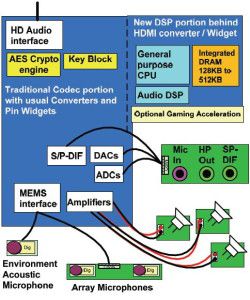From our front-page news:
I tend to be a wannabe audiophile, in that I love audio, but can't even begin to understand half of the terms thrown around during a real conversation. Intermodulation distortion? Seriously? Well, I'm confident that one thing even audiophiles don't likely ponder over often is the actual power draw required for certain technologies, such as Dolby True HD, and even things as minor as microphone noise reduction.
Apparently Intel does care, and apparently they let people know it in an IDF talk that most others (including us) completely overlooked. According to an article at the Inquirer, such technologies can draw loads of power... with Dolby True HD drawing upwards of 20% of a mobile Penryn CPU... that's considerable when any extra watt drawn can potentially result in 15 minutes less battery-life.
The solution? Offloading of the workload to a DSP, bypassing the OS in order to rid the interrupt load. Instead of a chip with another million transistors, the data transfers would be consolidated into a few DMA bursts, which apparently increases performance and also decreases power draw. Most of the attention right now is being targeted towards notebooks, naturally, but we can be sure to see such improvements made in our desktop counterparts at some point as well.

Finally, Realtek's upcoming ALC 269 'Vienna', the Audio DSP fitting into the 64-pin layout of the existing software-assisted mobo audio chips, was also discussed. This might be the entry point for hardware audio next year. The benefits? Tremendous - less power usage, higher overall system performance, more powerful media players.
Source: The Inquirer
Apparently Intel does care, and apparently they let people know it in an IDF talk that most others (including us) completely overlooked. According to an article at the Inquirer, such technologies can draw loads of power... with Dolby True HD drawing upwards of 20% of a mobile Penryn CPU... that's considerable when any extra watt drawn can potentially result in 15 minutes less battery-life.
The solution? Offloading of the workload to a DSP, bypassing the OS in order to rid the interrupt load. Instead of a chip with another million transistors, the data transfers would be consolidated into a few DMA bursts, which apparently increases performance and also decreases power draw. Most of the attention right now is being targeted towards notebooks, naturally, but we can be sure to see such improvements made in our desktop counterparts at some point as well.

Finally, Realtek's upcoming ALC 269 'Vienna', the Audio DSP fitting into the 64-pin layout of the existing software-assisted mobo audio chips, was also discussed. This might be the entry point for hardware audio next year. The benefits? Tremendous - less power usage, higher overall system performance, more powerful media players.
Source: The Inquirer
